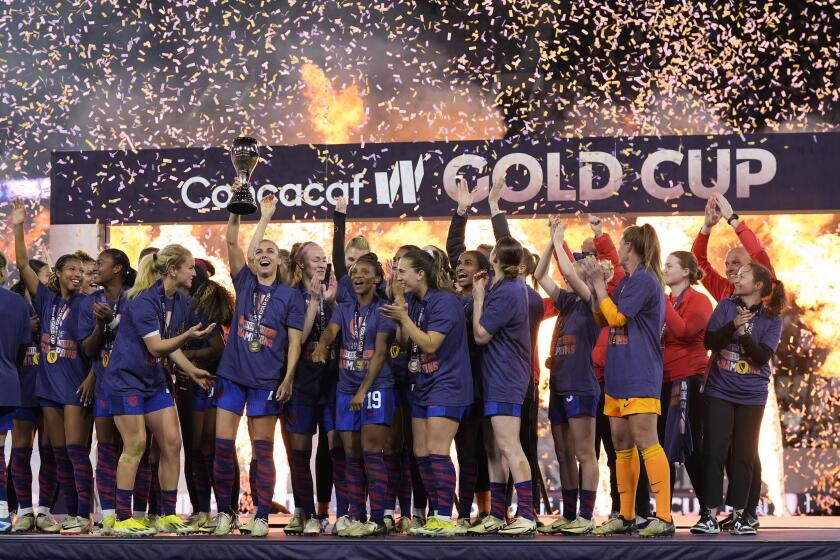Goodwill Games : For What It’s Worth, Turner, Made a Gesture
Westerners here feel sometimes as if they have been deserted on a faraway island. Since Tass is not necessarily the news, there often is nowhere to turn to stay current.
Ted Turner, whose business is communication, solved that by installing a direct telephone line in his office in the United States so that he would always know the score of the Atlanta Braves’ games.
But he had to take the worse with the bad. He also received up-to-the-minute information on the verbal grenades that were hurled his way by the critics, from William F. Buckley to Howard Cosell to Lester Maddox.
To say that Turner was unfazed is an understatement. When the Goodwill Games came to an end Sunday night with the Closing Ceremony at the Russian state hall, Turner was still standing. For effect, he should have clasped his hands above his head in the pose of a heavyweight champion. No one has ever confused this man with a lightweight.
“A lot of people didn’t think we’d pull this off,” Turner said.
A lot of people still don’t think Turner pulled it off.
If they are right, it is for the wrong reasons. What Turner promised was 17 days of competition in 18 sports between United States and Soviet athletes, and that is what he delivered, plus a bonus here and there.
So it wasn’t the Olympics.
So it wasn’t within XXIII Roman numerals of an Olympics.
But even the Olympics was considered nothing more than a grand illusion at first. When Baron Pierre de Coubertin, in 1892, advanced the idea of the modern Olympics, his critics called him an idealist with a noble but unmanageable plan, a skepticism that did not disappear even after the first Summer Games four years later, or even after the 21st Summer Games.
De Coubertin no longer was around to hear it, but his memory was cursed mightily in 1976 by the citizens of Montreal, who still are paying on their Olympic-sized Olympic debt.
As a capitalist, Turner, unlike De Coubertin, a Frenchman who was independently wealthy, carries around another pejorative adjective, opportunistic. But Turner also has strong idealistic impulses, perhaps even Populistic when you consider the strong pull his presence here has had on the Soviet people.
Perhaps they are attracted to his rhetoric, which is fashionable in the Soviet Union. There is little question they would rather hear an American talking about peace and friendship than calling the Soviet Union an “evil empire.”
But to an American ear, Turner sounds naive.
For his role with WTBS, Turner was named the outstanding journalist of the Goodwill Games. But one has to wonder what tough questions Turner put to Communist Party leader Mikhail Gorbachev during their meeting in the Kremlin Friday.
When it ended, Turner said: “We talked a little about the Goodwill Games, and a little about the world situation. I was favorably impressed with the secretary general. I think he’s a fine, intelligent leader. I admire his strong stand in trying to rid the world of nuclear weapons and his unilateral ban on nuclear testing.”
It is Turner’s efforts to link the Goodwill Games to the world situation, echoed by Gorbachev’s statements two weeks ago at the Opening Ceremony, that lead one to believe that neither man has a firm grasp of international sports.
When they say that athletic competition between the two countries will lead to a greater understanding of each other, they ignore the fact that Americans and Soviets have been competing for three decades, largely without incident, and that it has had little or no effect on the foreign policies of either nation.
But there were moments during the Goodwill Games, as there are at every international competition, when everyone who was here could share the vision, even while realizing it was nothing more than a mirage.
Perhaps the finest example was on the final night of the figure skating exhibition, when world champion Debi Thomas of San Jose joined the Soviet Union’s Vladimir Kotin in a pairs routine to the music of Michael Jackson’s “Billie Jean.”
Some among the capacity crowd of 12,300 at the Lenin Sports Palace were in tears, others were on their feet applauding.
Crucial to that moment perhaps was the knowledge that the American and Soviet athletes were not involved in competition. It was an exhibition.
When the Soviets and Americans were playing for real, there was little brotherhood.
Respect, yes. Brotherhood, no.
WTBS executives counted on this inevitability, even tried to exploit it, despite the peace proclamations of their employer, Turner.
When ratings lagged during the first week, one WTBS official said: “We’re not worried. We’ve got the U.S. vs. the Soviets in women’s basketball one night, the U.S. vs. the Soviets in women’s volleyball the next night and the U.S. vs the Soviets in water polo the night after that.”
Unfortunately for WTBS officials, they did not understand that most sports fans in American could not care less whether the Soviets are better than the United States in water polo. They may tune in to watch Lynda Carter vs. Heather Locklear in a sack race on “battle of the celebrity stars” but not two amateur water polo teams, even if they are the best in the world.
The exception is during the Olympics, which enjoys high ratings simply because it is the Olympics, even if the best teams in the world are not there, as was the case in 1984.
This miscalculation cost Turner a bundle, as much as $35 million, according to advertising industry insiders.
“It’s just more zeroes,” Turner said, attempting to convince listeners that the difference in losing $35 and $35 million is insignificant.
But despite Turner’s efforts to paint a happy face on every aspect of the Goodwill Games, except for the television ratings, which even he admitted were disappointing, there were problems here.
As expected, the hosts were well prepared for the games, and the organization for the most part was exceptional, but they had difficulty getting their stories straight as to why certain countries, such as Israel and South Korea, were not invited.
Initially, Soviet sports officials said that only the best in each sport were invited, and Israel and South Korea clearly did not qualify in any of the sports.
Considering, however, that there is an ersatz steeplechaser from Yemen who is still attempting to find the finish line at Lenin Stadium, the Soviets were forced to change their story. Officials said last week that Israel and South Korea were not invited because they did not request invitations, as if that were their responsibility.
The Soviets would have looked better if they had told the truth, which presumably is what they told WTBS officials when the matter was discussed before the games.
According to WTBS Executive Vice President Robert Wussler, the Soviets said they did not want to alienate the Arabs or the North Koreans by inviting Israel and South Korea. Wussler said the Soviets said they would invite whomever they wanted to Moscow and that WTBS could invite whomever it wanted to Seattle in 1990.
Speaking of which, will there be a Goodwill Games in 1990?
At least 30 people who think so are the representatives from Seattle who were in Moscow for the Goodwill Games. They were here from every branch of city government, from the mayor’s office to the city council to the police department to the YMCA.
But, according to one of the representatives, the city received its most important endorsement for the Goodwill Games from Don James. He is the football coach at the University of Washington. In America, you cannot go any higher than that.
More to Read
Go beyond the scoreboard
Get the latest on L.A.'s teams in the daily Sports Report newsletter.
You may occasionally receive promotional content from the Los Angeles Times.






